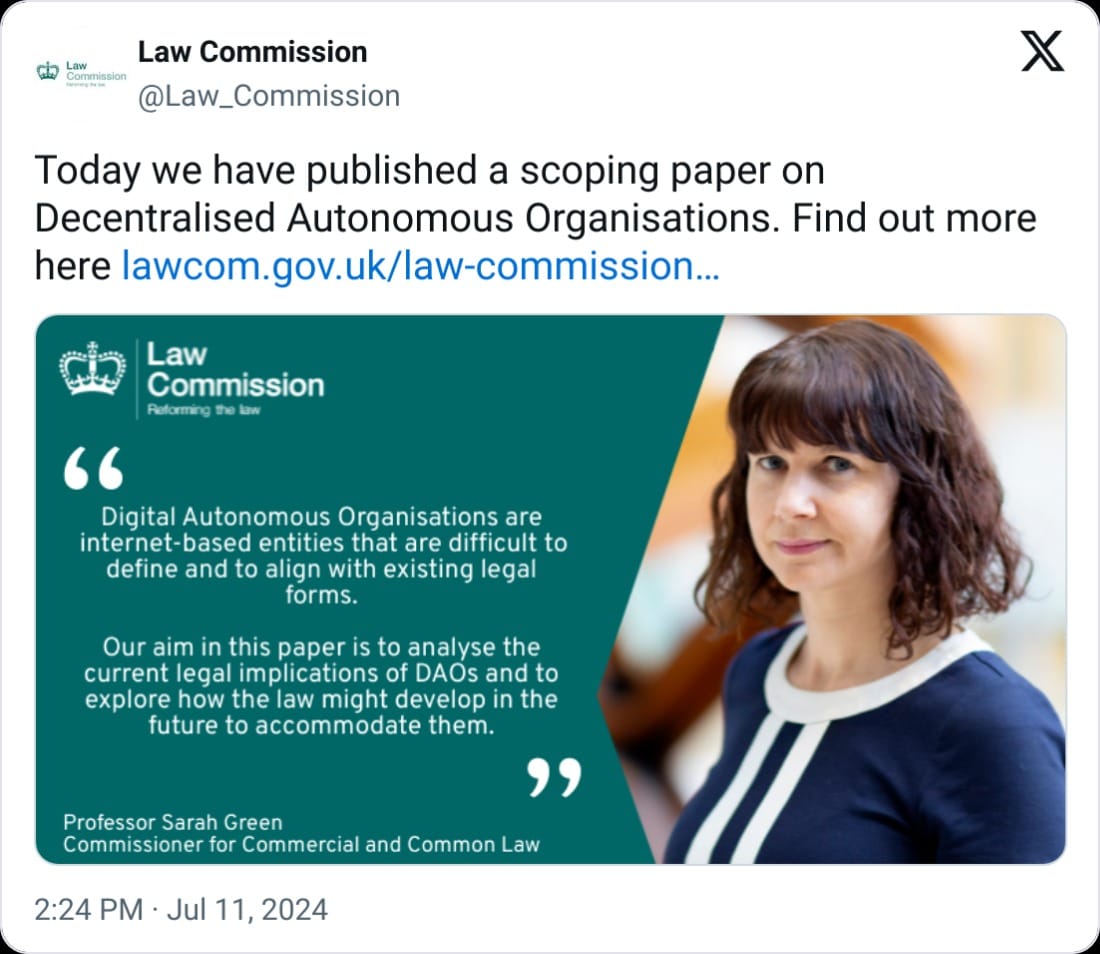The UK Law Commission has published a scoping paper indicating that there is no need for a distinct legal entity specifically for decentralized autonomous organizations (DAOs). Instead, it suggests that DAOs should be incorporated into existing financial regulations and tax frameworks. The paper also recommends a review of the Companies Act 2006 and calls for international cooperation on anti-money laundering (AML) and tax regulations.
Regulatory Hurdles for DAO Oversight
The UK Law Commission, a statutory body dedicated to law reforms, revealed in its scoping paper that there is no consensus on the characteristics of a DAO. This lack of consensus makes it challenging to implement a blanket law for DAOs, especially since the ecosystem is diverse and adapts its operations to local judicial requirements.
According to the reports, the commission identified a variety of DAOs, including pure DAOs, hybrid arrangements, and digital legal entities, adding to the complexity of characterizing such decentralized organizations for law reforms. These entities often operate as trustless systems, complicating their legal oversight.
“The Law Commission has already agreed with the Government to undertake a review of trust law,” the commission stated. This will consider — in general terms rather than in the DAO context specifically — the arguments for and against the introduction of more flexible trust and trust-like structures in England and Wales.”

Call for International Cooperation
Moreover, the UK Law Commission recommended reviewing the Companies Act 2006 to facilitate oversight of DAOs operating as limited liability partnerships. This review aims to identify and implement necessary reforms to better accommodate the unique operational structures of DAOs within the existing legal framework.
In addition to domestic legal reforms, the commission emphasized the need for international cooperation. It suggested that a global framework for AML and tax regulations is essential to effectively oversee DAOs. This international approach would help standardize the regulatory environment, making it easier for DAOs to operate across different jurisdictions.
Proposed Reforms and International Collaboration
The scoping paper highlights the necessity for reforms that address the specific needs of DAOs without creating an entirely new legal category. According to officials, the UK’s existing legal frameworks can be adapted to accommodate these decentralized entities, ensuring they are subject to appropriate oversight while fostering innovation within the sector.
The UK Law Commission’s approach aligns with broader efforts to regulate emerging technologies and financial innovations without stifling their potential. By integrating DAOs into the existing legal system and advocating for international collaboration, the commission aims to create a balanced regulatory environment that protects investors and maintains market integrity.
Addressing AML and Tax Concerns
The commission also addressed concerns related to AML and tax compliance for DAOs. It proposed that existing AML regulations should be reviewed and potentially amended to cover the unique characteristics of DAOs. This review would ensure that DAOs comply with international AML standards, reducing the risk of using these organisations for illicit activities.
Regarding tax frameworks, the UK Law Commission recommended that DAOs be included within the current tax regulations, with adjustments made as necessary to account for their decentralized nature. This inclusion would provide clarity for DAOs and ensure they are subject to appropriate tax obligations.
Broader Implications
The UK Law Commission’s recommendations have significant implications for the future of DAOs in the UK and beyond. By advocating for the integration of DAOs into existing legal frameworks and calling for international cooperation, the commission is paving the way for a more standardized and regulated environment for these entities.
This approach supports the growth and innovation of DAOs and provides a clear legal pathway for their operation. It ensures that DAOs are subject to necessary regulatory oversight, protecting investors and maintaining the integrity of the financial system.
Conclusion
In conclusion, the UK Law Commission’s scoping paper suggests that there is no need for a separate legal entity for DAOs. Instead, it recommends integrating DAOs into existing financial regulations and tax frameworks, with a review of the Companies Act 2006 and international cooperation on AML and tax regulations. This approach balances the need for regulatory oversight with the desire to foster innovation, creating a supportive environment for the growth of DAOs.
The UK Law Commission sets a precedent for other jurisdictions by addressing the unique characteristics of DAOs within the existing legal framework. This balanced approach ensures that DAOs can operate effectively while being subject to appropriate regulatory oversight, protecting investors and maintaining market integrity. Stay tuned to The BIT Journal for the latest news.




























